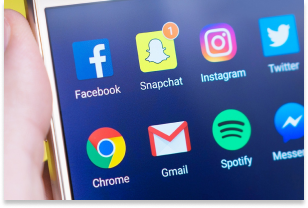Here’s to the hashtags, the likes, the followers, the DMs, and the LOLs—June 30th marks Social Media Day, a time to celebrate and reflect on how social media has changed our lives over the years.
Started in 2010 by media and entertainment company Mashable, celebrations have taken on all kinds of forms. Meetups, contests, calls to increase your social circle by one meaningful connection have all marked the date in the past. Yet this year feels like an opportunity to consider just how heavily so many of us have leaned upon social media these past months, particularly in a world where nearly 50% of the global population are social media users to some degree or other.
What’s more, people worldwide spend an average of 145 minutes a day on social media. With users in the Philippines spending three hours and 53 minutes a day and users in the U.S. spending just over two hours a day, that figure can vary widely, yet it’s safe to say that a good portion of our day features time browsing around on social media.
With that, Social Media Day is also a good day to give your social media settings and habits a closer look, all so that you can get the most out of it with less fuss and worry. Whether you’re using Facebook, Instagram, TikTok, or whatnot, here are several things you can do that can help keep you safe and secure out there:
1. Go private
Social media platforms like Facebook, Instagram, and others give you the option of making your profile and posts visible to friends only. Choosing this setting keeps the broader internet from seeing what you’re doing, saying, and posting, which can help protect your privacy.
2. Say “no” to strangers bearing friend requests
Be critical of the invitations you receive. Out-and-out strangers could be more than just a stranger, they could be a fake account designed to gather information on users for purposes of cybercrime, or they can be an account designed to spread false information. There are plenty of them too. In fact, in Q1 of 2021 alone, Facebook took action on 1.3 billion fake accounts. Reject such requests.
3. Think twice before checking in
Nothing says “there’s nobody at home right now” like that post of you on vacation or sharing your location while you’re out on the town. In effect, such posts announce your whereabouts to a broad audience of followers (even a global audience, if you’re not posting privately, as called out above). Consider sharing photos and stories of your adventures once you’ve returned.
4. The internet is forever
It’s a famous saying for a reason. Whether your profile is set to private or if you are using an app with “disappearing” messages and posts (like Snapchat), what you post can indeed be saved and shared again. It’s as simple as taking a screenshot. If you don’t want it out there, forever or otherwise, simply don’t post it.
5. Watch out for phishing scams
We’re increasingly accustomed to the warnings about phishing emails, yet phishing attacks happen plenty on social media. The same rules apply. Don’t follow any links you get from strangers by way of instant or direct messengers. And keep your personal information close. Don’t pass out your email, address, or other info as well. Even those so-called “quiz” posts and websites can be ruses designed to steal bits and pieces of personal info that can be used as the basis of an attack.
6. Review your tags
Some platforms such as Facebook allow users to review posts that are tagged with their profile names. Check your account settings and give yourself the highest degree of control over how and where your tags are used by others. This will help keep you aware of how you’re being mentioned by others and in what way.
7. Protect yourself and your devices
Security software can protect you from clicking on malicious links while on social media, strengthen your passwords so your social media account doesn’t get hacked, and boost your online privacy as well. With identity theft a sadly commonplace occurrence today, security software is really a must.

